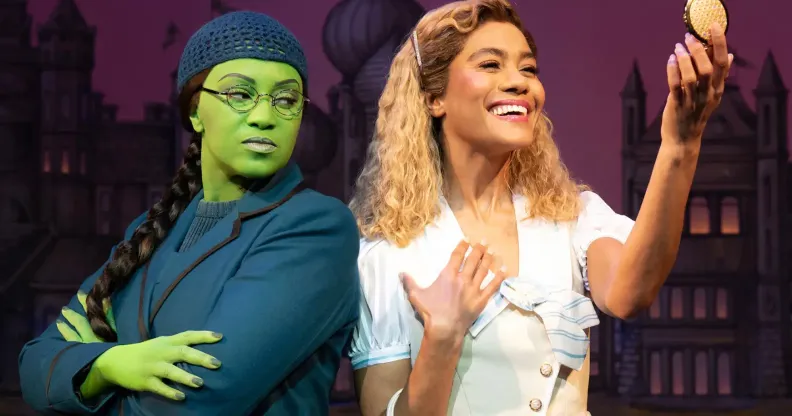How Wicked’s queer themes earned hit musical a legion of LGBTQ+ fans

Alexia Khadime (Elphaba) and Lucy St. Louis (Glinda) in Wicked. (Matt Crockett)
Wicked, already one of the most successful theatre productions of all time, could well become the biggest musical of all time when it finds its way to the big screen next year. We take a look at its queer themes, and why it’s such a hit with LGBTQ+ fans.
Wicked opened on Broadway in October 2003, long before villain origin stories became Hollywood’s go-to cash cow.
Based on the Wizard of Oz, and adapted from Gregory Maguire’s 1995 novel Wicked: The Life and Times of the Wicked Witch of the West, it tells the story of the Wicked Witch of the West, giving her a first name, Elphaba, and some humanity to go along with it.
In the show, Elphaba is an outcast. Born of an affair her mother had with a travelling salesman, she arrives into the world in the play’s opening scene with bright green skin, and is promptly rejected by her cuckolded father. Fast-forward roughly two decades, and Elphaba is arriving at Shiz University with her sister Nessarose.
She’s promptly made roommates with the future Glinda the Good Witch. While Elphaba immediately shows signs of powerful, but uncontrolled, magic powers, Glinda is an annoying nepo baby without any discernible talent.
Naturally, the two become unlikely friends, but Elphaba’s time at school is derailed as she uncovers a plot to suppress magical animals.
In London, Wicked has been a major draw since it opened in 2006. Idina Menzel, who originated Elphaba on Broadway, reprised her role, becoming the highest-paid actress in West End history. Sadly, she wasn’t reunited with Kristen Chenoweth, the original Glinda, though she did share the stage with Miriam Margolyes, as the rotten Shiz headmistress, Madame Morrible.
Wicked has LGBTQ+ themes
Wicked’s central song, “Defying Gravity”, has transcended the stage, finding its way to talent shows and Pride concerts around the world.
The latter is no surprise, really – the song, and Wicked more broadly, deal with themes of being different, learning to be “through accepting limits”, and embracing the things that one “cannot change” about oneself.
Elphaba’s crusade against animal oppression can be read as an allegory for the Pride movement, while Elphaba and Glinda’s love for one another has inspired more than a few pieces of sapphic fanfiction.
Overall, the story is one of an outsider rejected by society, tackling themes of institutional prejudice and forbidden love.
Currently, the West End show is led by Alexia Khadime (Elphaba) and Lucy St. Louis (Glinda), both vocal and acting powerhouses. Notably, it’s the first time the two leads have been played by Black women in the London production.
Booked until June 2024, a UK and Ireland tour is also set to open in December 2023.
Now the 12th longest-running musical in West End history, Wicked stands as a major piece of IP all by itself. Naturally, a film adaptation is incoming.
Wicked film cast filled with LGBTQ+ icons
A film version of Wicked was first announced in 2012, but it was a decade before cameras began rolling. Stephen Daldry (Billy Elliot, The Crown) was originally to direct a version that would have premiered in 2019, but after delays he left the project due to scheduling conflicts.
In 2021, Jon M Chu was announced as director, with Ariana Grande and Cynthia Erivo confirmed as Glinda and Elphaba soon after, followed by news Jonathan Bailey would play love interest Fiyero. Both Erivo and Bailey are part of the LGBTQ+ community.
Michelle Yeoh will plays Madame Morrible, with Jeff Goldblum as the Wizard.
The casting announcements ended years of speculation as to who would lead the film – over the years, Menzel and Chenoweth, Amnada Seyfried and Lea Michele are among the many names who’ve been floated.
Winnie Holzman and Stephen Schwartz, who wrote the musical’s book, have also penned the script for the film, which will be released as two parts.
Filming began at the end of 2022 in London. The little that has emerged from the set – wide-lens images showing Elphaba and Glinda’s costumes, a paparazzi video of Grande singing “No One Mourns the Wicked” – has fans rabid for more. The cast was 10 days away from completion when the SAG-AFTRA actor’s strike forced them to down tools. Chu has said this won’t affect the films’ release dates – part one is due to arrive in cinemas on 27 November, 2024, with part two following a year later, on 26 November, 2025.
How did this story make you feel?

